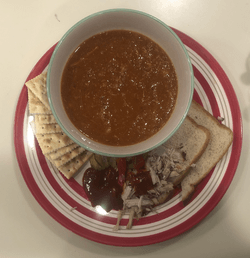Burgoo facts for kids

Kentucky burgoo served various side dishes
|
|
| Alternative names | Roadkill soup |
|---|---|
| Type | Stew |
| Place of origin | United States |
| Region or state | Kentucky, Illinois, Indiana, West Virginia |
| Main ingredients | Meat (pork, chicken, or mutton) |
Burgoo is a thick, hearty stew, much like other stews you might know, such as Irish stew. People often enjoy it with cornbread or corn muffins. It's a popular dish in the American Midwest and South. Many communities make burgoo together for social events or to raise money for local schools and charities.
Contents
What is Burgoo?
Burgoo is a type of stew that's famous for being packed with different kinds of meat and vegetables. It's cooked slowly, often for many hours, which makes it very thick and flavorful. The exact ingredients can change a lot, depending on who is making it and what's available.
Where Did the Name Come From?
The word "burgoo" has a bit of a mystery around its origin. Some people think it might come from old Welsh words that mean "yeast" and "cabbage." No matter where the name came from, the stew itself has a long history in American cooking.
How Is Burgoo Made?
Making burgoo is a special process that often involves a lot of people and a big pot!
Traditional Ingredients
In the past, burgoo was made with whatever meats and vegetables people could find. This sometimes included venison (deer meat), squirrel, opossum, raccoon, or even game birds. It was especially popular in the autumn, during the harvest season, when many ingredients were fresh.
Today, burgoo usually uses more common meats like pork, chicken, or mutton (lamb). Many barbecue restaurants have their own secret recipes, using special spices that give their burgoo a unique taste.
Common Ingredients Today
A typical burgoo recipe includes a mix of meats and lots of vegetables.
- Meats: You'll often find pork, chicken, mutton, or beef. Sometimes, the meat is smoked over hickory wood for extra flavor.
- Vegetables: Popular choices include lima beans, corn, okra, tomatoes, cabbage, and potatoes.
Because burgoo cooks for a long time, the vegetables release their natural starches, which helps to thicken the stew. Sometimes, cooks might add extra thickeners like cornmeal or potato starch to make it even heartier. Adding soup bones can also make the stew taste richer and thicker.
Cooking Process
The ingredients are added to the pot in a specific order. Meats go in first because they take the longest to cook. Then, the vegetables are added. Any thickening agents are usually put in last, if needed. People often say that a good burgoo is so thick, a spoon can stand straight up in it!
To give it extra zing, people often add cider vinegar, hot sauce, Worcestershire sauce, or chili powder as condiments.
Where Is Burgoo Popular?
Burgoo is more than just a meal; it's a big part of community life in certain parts of the United States.
Community Events
In Kentucky and nearby states like Indiana, making burgoo is often a group effort. Everyone brings an ingredient or two, and they cook it together. This makes it a fun social event. Burgoo is also a favorite for school fund-raisers in these areas. Some people say this tradition was started by the family of Ollie Beard, a former Major League Baseball player.
Festivals and Claims to Fame
Many towns are very proud of their burgoo and feature it at local events.
- The village of Arenzville, Illinois claims to have the world's best burgoo and hosts a yearly burgoo festival.
- Chandlerville, Illinois, also in Cass County, has its own burgoo festival.
- Several cities, including Lawrenceburg, Kentucky, Owensboro, Kentucky, and Franklin, Illinois, all claim to be the "burgoo capital of the world."
- In Brighton, Illinois, a traditional burgoo is made and served every year at the village's summer festival, called the Betsey Ann Picnic.
- At the famous Kentucky Derby, burgoo is often served and is considered a classic dish.
Burgoo is a delicious and important part of the culture in these regions, bringing people together over a warm, hearty meal.
 | Jessica Watkins |
 | Robert Henry Lawrence Jr. |
 | Mae Jemison |
 | Sian Proctor |
 | Guion Bluford |

